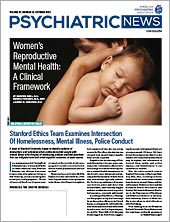Stigmatizing language and negative descriptors appear more frequently in the electronic health records (EHRs) of Black patients compared with those of White patients, two studies have found. The first study, published in Health Affairs, revealed that Black patients had more than twice the odds of being described in EHRs with one or more negative descriptors—such as “agitated,” “angry,” “aggressive,” and “not compliant”— compared with White patients. The second study, published in JAMA Network Open, found that stigmatizing language, such as “nonadherence,” “belligerent,” and “abuser” more often appeared in the records of Black patients compared with those of White patients.
These studies point to the need for health and mental health professionals to become aware of their own biases, said Andrew Saxon, M.D., the director of the Center of Excellence in Substance Addiction Treatment and Education at the VA Puget Sound Health Care System and a former member of APA’s Council on Addiction Psychiatry.
“[Health professionals] need to be conscious of it, observe their own behavior, and correct themselves when they slip into stigmatizing thoughts and language,” said Saxon, who was not involved in either study. “Oftentimes there is no conscious ill intent, and we’re just mimicking the people who taught us this language at a time when society was much less conscious of how words matter.”
Michael Sun, a medical student at the University of Chicago’s Pritzker School of Medicine and lead author of the study in Health Affairs, agreed.
“We weren’t born knowing how to write medical documentation. It’s a learned skill. From a systems perspective, the way we have trained people to do medical documentation has an inherent bias,” Sun told Psychiatric News.
Sun and colleagues used machine learning techniques to analyze health professionals’ use of negative patient descriptors in the history and physical notes in the EHRs of 18,459 patients seen at a large, urban academic medical center in Chicago. These data included health records for patients who received treatment in an emergency department, inpatient setting, or outpatient setting between January 1, 2019, and October 1, 2020.
In total, the EHRs of 8.2% of the patients included negative descriptors. After controlling for sociodemographic and health characteristics, the researchers found that Black patients had 2.54 times the odds of being described with one or more negative descriptors in the EHR compared with White patients. Furthermore, Black race was associated with 5.6 additional negative notes per 100 patients relative to White race.
Sun said that neither he nor many of his peers found the results surprising. “This is what we’ve been seeing for a while, but now we have data to show it and can find it objectively in the health care system,” Sun said.
In the JAMA Network Open study, Gracie Himmelstein, M.D., Ph.D., a resident physician at the University of California, Los Angeles, and colleagues analyzed 48,651 admission notes written about 29,783 patients by 1,932 health professionals at a large, urban academic medical center between January and December 2018. The admission notes included notes about patients with diabetes, substance use disorder (SUD), or chronic pain.
The researchers found that 2.5% of the notes contained stigmatizing language and that overall the notes of Black patients were nearly 1.3 times more likely to have stigmatizing terms than those of White patients. However, among patients whose notes were about SUD, the notes about Black patients were 1.7 times more likely to have negative terms than those of White patients.
“That only 2.5% of the notes have stigmatizing language shows that most [health professionals] are usually writing unbiased notes,” Himmelstein told Psychiatric News. “On the other hand, there is still some stigmatizing language. Our results allow us to see who is affected most by it so we can change it and educate the people who are still using it.”
Himmelstein said that health professionals should look at their EHR notes from the perspective of the next person who will read them.
“Read through what you write. Take a step back and read your notes as though you were someone who is meeting the patient for the first time. What do those notes tell you about the patient?” Himmelstein said. “Terms like ‘drug-seeking’ or ‘noncompliant’ paint an image of a patient that suggests the patient has bad intentions when that might not be true.”
Saxon was particularly struck by the disparity in the use of stigmatizing language with reference to SUD.
“That particular finding highlights the intersection of structural racism and the stigma of SUD. It underscores the negative thoughts people may have about different groups who are already marginalized,” Saxon said.
Himmelstein said that addressing bias and stigma in documentation begins in medical school.
“As a medical student, you’re trained how to write these notes. It’s a big part of the process of transferring from the preclinical years to the clinical years,” she said. “It’s important to understand early on that that [the EHR] is a guiding document that affects patient care. Every time you meet a patient, you pull up the patient’s chart and read through the notes, and what is written there affects every patient encounter.”
Sun said that medical school is a good start, but that addressing stigmatizing and biased language in the EHR is a lifelong process, especially because medical graduates may go into residencies in institutions that are unfamiliar with the issue. Therefore, avoiding using stigmatizing or biased language becomes a matter of individual vigilance.
“Think about what opportunities you may have to provide further context about the patient in the notes so as not to mislead or predispose other [health professionals] to bias,” Sun said. “It may well be that the patient is angry. Anger is sometimes a symptom, and you have to include it in your notes. But why is the patient angry? It’s not that we should never use negative words [like ‘anger’], but that we need to provide context to better inform medical care.”
The study in Health Affairs was supported in part by the University of Chicago Medicine’s Center for Healthcare, Delivery Science, and Innovation; the National Heart, Lung, and Blood Institute; and the Chicago Center for Diabetes Translation Research as funded by the National Institute of Diabetes and Digestive and Kidney Diseases. The study in JAMA Open Network was supported by the Eunice Kennedy Shriver National Institute of Child Health and Human Development, and its publication was supported by the Princeton University Library Open Access Fund. ■



